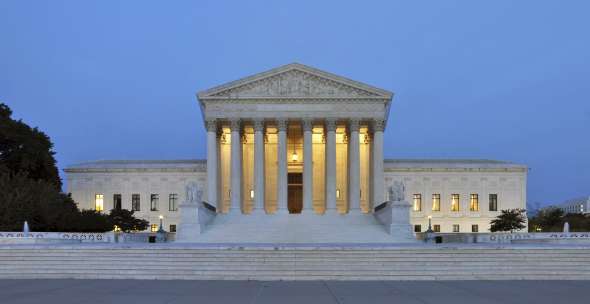A group of Democratic plaintiffs is asking the U.S. Supreme Court to uphold a ruling that struck down Wisconsin’s Republican-drawn legislative map as an unconstitutional partisan gerrymander.
In a brief to the court, plaintiffs wrote that Wisconsin remains sharply divided politically, with a Democratic president winning the state in 2012 and a Republican winning in 2016. Similarly, they wrote, Wisconsin is represented in the U.S. Senate by one Democrat and one Republican.
But the state Legislature is a different story, where Republicans won 60 out of 99 Assembly seats in 2012 despite losing the popular vote and grew their majority to 64 seats in 2016, even as the statewide vote remained nearly tied.
News with a little more humanity
WPR’s “Wisconsin Today” newsletter keeps you connected to the state you love without feeling overwhelmed. No paywall. No agenda. No corporate filter.
“Republicans thus wield legislative power unearned by their actual appeal to Wisconsin’s voters,” the plaintiffs told the court.
A panel of federal judges overturned Wisconsin’s legislative map late last year, ruling the map was intended to burden the rights of Democratic voters by impeding their ability to translate votes to legislative seats. The court issued a separate order in January, directing the Legislature to redraw Wisconsin’s map by Nov. 1 so it would be ready in time for the November 2018 general election.
Without the lower court’s ruling, plaintiffs wrote Wisconsin’s map would have continued to skew control of the state Legislature in Republicans’ favor, even if Democrats turned out in record numbers to vote.
“That is precisely why judicial intervention was necessary here — to correct a serious democratic malfunction that would otherwise have gone unremedied,” they wrote.
But Wisconsin’s redistricting case is being watched well beyond the state’s borders. Republicans from around the country worry that if the ruling is allowed to stand, it would usurp the constitutional power of state legislatures and set a standard for redistricting lawsuits that could overturn maps around the country. They’ve asked the U.S. Supreme Court to hear the case on appeal, and reject it.
Democratic plaintiffs argue they’ve developed a standard that would only weed out the most severe partisan gerrymanders, like Wisconsin’s. Under their proposal, a court would have to find lawmakers intended to draw a map for partisan advantage, and that the map had indeed resulted in skewed election results.
Plaintiffs said courts could measure a map’s partisan advantage in a variety of ways, including by looking at its “efficiency gap,” a metric developed recently by political scientists at the University of Chicago. The efficiency gap measures the correlation between overall votes for the legislature and the number of legislative seats each party actually wins.
Plaintiffs told the court that Wisconsin’s map, known as 2011 Act 43, had produced one of the biggest efficiency gaps — and biggest gerrymanders — out of any developed nationwide over the past four decades. They said the plan would preserve Republican control of the legislature in even the biggest of Democratic wave elections.
This case could proceed in a number of different ways. If the U.S. Supreme Court decides not to hear Wisconsin’s appeal, it would mean the lower court’s ruling stands, and would force Wisconsin Republicans to redraw the state’s legislative map.
If the court hears Wisconsin’s appeal — a move many court watchers think is likely — whatever it decides could establish a precedent for redistricting cases throughout the nation.
Wisconsin Public Radio, © Copyright 2025, Board of Regents of the University of Wisconsin System and Wisconsin Educational Communications Board.





